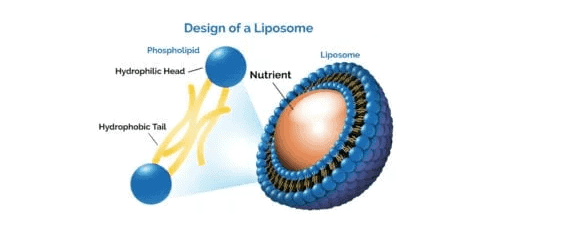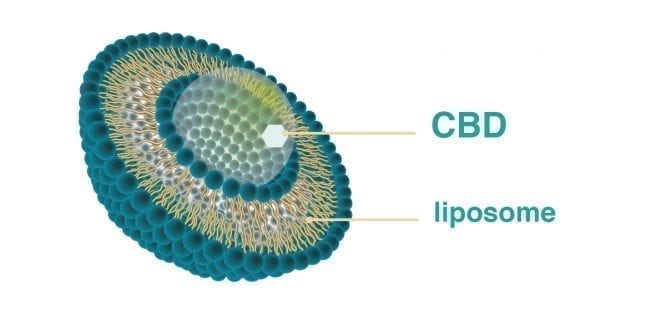Last Updated on February 4, 2021 by Maxwell Harris
What is Liposomal CBD?
CBD, short for Cannabidiol, is a multipurpose cannabinoid with excellent anti-inflammatory, analgesic and anti-anxiety features. Unfortunately, it can be a bit challenging for the body to utilise these helpful qualities. The molecular structure of CBD makes its absorption in the body more difficult compared to other cannabinoids like the THC.
Luckily, the liposomal CBD helps ease the absorption of CBD. It surrounds the cannabinoid (CBD), with an element that can easily be absorbed in the body. This unique element makes it easy for the body to utilize CBD’s properties, thus increasing its effectiveness. In addition, you consume less CBD and get more results.
What does Liposomal mean?
Liposomes are tiny scopes surrounding a medicine or nutrient like CBD, which supports its assimilation in the body. The name liposome originated from Greek. It constitutes of Greek words lipos, which means fat and soma meaning body.
According to Dr Adie Rae, an expert in medicinal cannabis and CBD, a liposome is simply a sphere-like package that is used to pack a drug. Liposomes are made from phospholipids that are the same molecules in the body’s cell membrane. Phospholipids help in drug absorption as well as preventing the breakdown of a drug in the digestive region. This unique feature makes CBD more effective.
Liposomal delivery system: what is this?
Trillions of cells make our existence possible and help perform everything we do in everyday life. While each one has a particular function and is unlike any other, all body cells share similar cellular parts including a membrane. Cell membranes basically help a cell stay together – just like our skin contains our body. A cellular membrane is responsible for transporting compounds in and out of the cell as well as interacting with compounds floating by. Some compounds such as electrolytes get transported very efficiently. Unfortunately, this is not the case for CBD
Liposomes were initially discovered in the 1960s. Since then, there have been developments to improve their effectiveness in delivering essential nutrients and other compounds such as CBD in the body. Liposomes are made out of the same material as cell membranes making them biodegradable and bioavailable
Dr Rae argues that continuous studies of the liposomal delivery system and CBD have improved the liposomal effectiveness and bioavailability. This, in turn, enhances the absorption rate of medicines and nutrients in the human bloodstream. Besides, improved liposomal bioavailability aids in the movement of CBD in tissues, cells and body organs; thus, consumers get the desired benefits from their CBD.
Liposomes are water-soluble and fat-soluble. These unique features aid in providing molecules in liposomes to the intended destinations without any degradation.
Related: Water Soluble CBD Products. All You Need To Know

What is Bioavailability?
In order to understand the advantages of liposomal delivery, you must understand the concept of bioavailability. Bioavailability denotes the extent to which a nutrient or a drug (in this case, cannabidiol CBD) is available to be used in the anticipated biological destination (e.g the endocannabinoid system). Bioavailability varies depending on how one consumes a constituent. For example, administration through the veins provides a hundred per cent bioavailability. This is essential when nurses and doctors are administering drugs and nutrients to patients.
CBD formulations that are administered through the mouth are very common. However, these formulations have quite a lower bioavailability compared to inhaled CBD formulations. This is because most of the oral CBD is wasted in the digestive system resulting in less than nine per cent bioavailability.
However, liposomal products aids in protecting the CBD from digestive enzymes in the digestive tract. According to Endocannabinoid Medicine journal, all patients who took liposomal CBD oil orally had it in their bloodstream after an hour. Contrary, only 40% of patients who took standard CBD oil had it in their blood after an hour.
Advantages of liposomal CBD
Liposomal delivery increases bioavailability. This is the primary and most crucial feature of liposomal delivery. Liposomes protect the CBD, ensuring they remain complete as they reach body tissues and cells.
By this, the CBD is protected from digestive enzymes that would damage them. This, in turn, increases bioavailability three times more. Additionally, the CBD becomes more effective and works at a faster rate meaning you may use little and get the maximum effect.
As bioavailability increases, the body absorbs more CBD, thus utilizes all its benefits. Liposomal CBD oil is more cost-effective compared to non-liposomal CBD. Because of the higher bioavailability, the CBD products simply last longer.

Are Liposomal CBD Products Better?
Liposomal CBD products help your body absorb more CBD and therefore increase the effectiveness of the compound. Liposomal CBD, however, may be more expensive compared to other CBD products; therefore, people may end up not using them.
Do Liposomes have Dangerous Effects?
According to research, liposomes are generally safe for health. In fact, they allow excellent control and limit the toxicity of some substances. Experts continue to research them to identify the unique properties of lysosomes, especially in connection to CBD. In a current safety study relating to liposomal CBD, no patient experienced dangerous effects on kidney function, blood sugar levels, liver function or fluid balance and electrolyte. People whose blood measures ranged from low to high were not affected by this kind of CBD oil. Surprisingly, people with high glucose levels in their body were able to bring it back to normal after taking liposomal CBD treatment for a month. Although the results are based on a small population, it was concluded that liposomal CBD is safe to use.
Nonetheless, when working with liposomes, expert care is always required, as not every substance reacts well combined with a liposomal coating. All drugs, including liposomal, should be studied thoroughly before they enter the market.
Research on liposomes includes:
- Liposomal drug delivery systems: From concept to clinical applications
- Transendothelial Movement of Liposomes In Vitro Mediated by Cancer Cells, Neutrophils or Histamine
- Immunoliposomes
- Liposomes as nanomedical devices
References
Sercombe, L., Veerati, T., Moheimani, F., Wu, S. Y., Sood, A. K., & Hua, S. (2015). Advances and Challenges of Liposome Assisted Drug Delivery. Frontiers in pharmacology, 6, 286. https://doi.org/10.3389/fphar.2015.00286
Bangham A.D., Standish M.M., Weissmann G. (1965). Diffusion of univalent ions across the lamellae of swollen phospholipids. J. Mol. Biol, 13:238–252. doi: 10.1016/S0022-2836(65)80093-6.
Pauli G, Tang WL, Li SD. Development and Characterization of the Solvent-Assisted Active Loading Technology (SALT) for Liposomal Loading of Poorly Water-Soluble Compounds. Pharmaceutics. 2019;11(9):465. Published 2019 Sep 9. doi:10.3390/pharmaceutics11090465